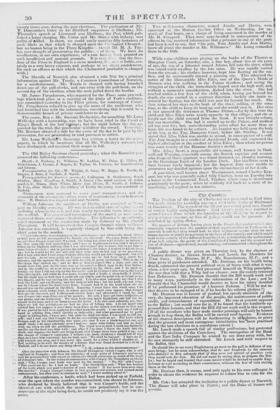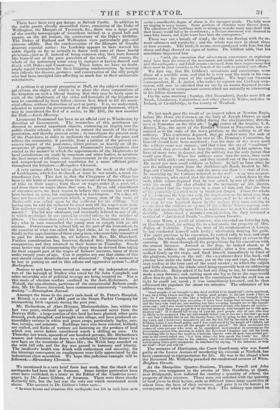Etc! Courfti . ::.
• The freedom of' the city- of Chichester was presented to Earl Grey
last week, while his .Lordship WitS Oil to tile Duke of Richmond at Goodwood. Tlie speech of the Mayor a. Very good one, though of course highly complimentary. Earl Gray's reply was couched in general terms, from ihjcli the intention of the lioi,try in- regard to :Coy particular measure, or hoe of policy, could not he guessed. He concluded by saying, that— The measure of Reform haying given to the People that ecntrol e.--hielt they reasonably required over the conduct ef their representatives in Parliament, he earnestly hoped tint they would look to their legitimate orgami alone for such improvements as might be necessary in the laws of the country, aud.whivh might tend to the sem:tits, of the different branches of tie constitution, the maintenance of our holy religion, tile purity of the Established Church, and the general wel- fare of all classes—agricultural, manufacturiag, andeommercialthreughout the kingdom.
4 public dinner was given on Thursday last, by the electors of Chertsey district, to Messrs. Denison and Leech, the Members for West Surry. Mr. Briscoe, M.P.,. Mr..Rainsbottom' N. P. and a large party of gentlemen attended. Mr. Denison, on his health being drunk, contrasted the present political state of Surry with what it was, when, a few years ago, he first presented himself on Whig principles. He was then told that a Whig had no chance : now the County returned four Reformers. Mi. Denison thought that the Bill would .work well in many ways, particularly in the reformation of the Law; and he thought that the Chancellor would deserve to have his 'Salary doubled if he performed his promises of -Chancery Reform. [Will be not ra- ther deserve to be stripped -of it, if he breaks his solemn pledges ?] Mr. Denison was in favour of gradual,- but speedy abolition of sla- very, the improved education of theJpeoPle' the maintenance of public Credit, ..and retrenchment of expenditure. He was at present opposed to the Ballot ; but would vote for it, if he found that the landlords op- pressed their tenants, and that the Bill did not -work well in this respect. [Hall' the members. Who have made similar promises will only be honest enough to keep them, the Ballot will be carried neitiession. Evidence of the clearest description will be forthcoming in alitindance, to prove that the grossest and most outrageous intimidation hailiecu practised during the late elections to a scandalous extent.] • -• - Mr- Leech made a speech full of similar professions, but protested against the abolition of the Corn-laws. The monopolies of the Bank and' the 'East India Company he _wished to see. done away with, but his o. tin monopoly he still cherished. Mr. Leech said With respect to
the •Ballot, that -
He should like to see every Englishman goierect to the poll in defiance of any man living; but he must acknowledge, that he met hundreds. in his canvass who, declarel to him solemnly that if they were not afraid of positive ruin they would vote for him. He did not mean by saying that, to propose the Bal- lot ;- but he hoped and trusted that some means would be devised to enable Eng- lishmen to vote according to their consciences, without the fear.Of 'rain staring them in the face. -Mr. Denison then, it seems, need only apply to his own-colleague in order to obtain the evidence be requires to induce him to vote for the Ballot.
Mr. Coke has accepted the invitation'to•a public dinner at .Norwich. The dinner will take place in March.; and the Duke a Sussex will preside.
There have been very gay doings at Belvoir Castle. In additien to
• the noble guests already assembled there, consisting of the Duke of Wellington the Marquis of Tavistock, &c., there was a large party of the worthy townspeople of Grantham invited to a grand ball and supper, on the 4th instant, the anniversary of the Duke's birthday. The Dukes of Rutland and Wellington were particularly gay—and extreme affable. But the condescension of the Marquis of Granby deserves especial notice : his Lordship appears to have waived his noble dignity so far as actually to dance with some of those horrid plebeians—just as if, instead of being common clay, they were formed like himself out of the pure porcelain of the earth. Of course, the whole of the mobocracy went away in raptures at having danced and drunk with Dukes and Countesses. These latter, we have no doubt, amply repaid themselves for their fatiguing condescension, by turning into ridicule the dresses, gestures, and conversation of the silly people who had been inveigled into affording so much fun to their aristocratic entertainers.



















 Previous page
Previous page